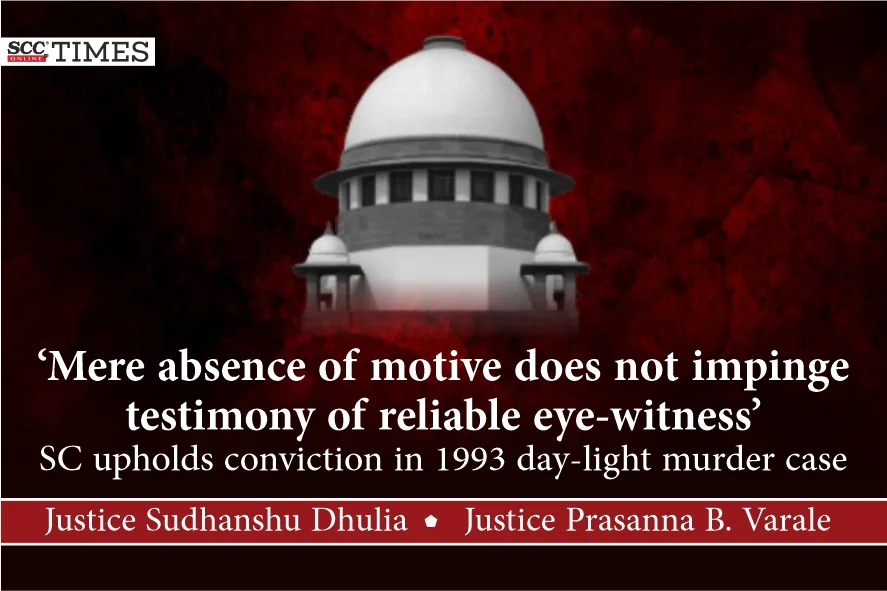Supreme Court: In a criminal appeal against conviction under Section 302 of the Penal Code, 1860 (‘IPC’), upheld by the Delhi High Court, the Division Bench of Sudhanshu Dhulia* and Prasanna B. Varale, JJ. dismissed the appeal and upheld the Trial Court’s and High Court’s decision.
Factual Matrix
In the day light murder, the star eye-witness/sister-in-law of the deceased on 28-05-1993 saw the convict and deceased grappling with each other and then the convict stabbed the deceased multiple times with the knife he was carrying. The deceased fell on the ground and the convict fled away. The deceased was first taken to the adjacent clinic and later to Hindu Rao hospital, where he was declared dead.
After filling of the First Information Report and investigation, a charge-sheet was filed against the convict for offence und the Section 302 of the IPC.
Analysis
Recovery of weapon from the convict
The Court noted that the convict was caught on the same day of the crime, along with the knife, used in the commission of the crime. The Court also perused the forensic report and other evidence which showed that the knife was recovered from the possession of the convict and was used in the commission of the crime, and that the blood of the deceased matched with the blood found on the knife.
Regarding the doubts raised on the manner of recovery of the knife from the convict, the Court refused to accept the same in view of the fact that the blood of the deceased clearly matched with the blood found on the knife, and together with the ocular evidence in the form the star eyewitness. The Court also said that the time span between the murder, arrest of the convict and recovery of the weapon, to be very little time gap.
Motive
The Court said that it was indeed true that no ‘motive’ was established on the convict by the prosecution for committing this dastardly act, but considering the reliable star eye-witness, the ‘motive’ itself was of little relevance.
On the said aspect, the Court cited Shivaji Genu Mohite v. State of Maharashtra, AIR 1973 SC 55, was held that it is a well-settled principle in criminal jurisprudence that when ocular testimony inspires the confidence of the Court, the prosecution is not required to establish motive and that mere absence of motive would not impinge on the testimony of a reliable eye-witness. The Court stated that motive is an important factor for consideration in a case of circumstantial evidence, but when there is direct eye-witness, motive is not significant.
Decision
Therefore, the Court said that there was no reason to interfere with the orders of the Trial Court and that of the High Court.
Hence, the Court said that both the Trial Court and the Appellate Court had rightly held that the prosecution had proved their case beyond reasonable doubt, as all the evidence put together did establish the guilt of the convict. Accordingly, the Court dismissed the appeal and the interim order dated 09-05-2012 granting bail to the convict was vacated. The Court directed the convict, on bail to surrender before the Trial Court within a period of four weeks from the date of decision.
CASE DETAILS
2024 SCC OnLine SC 496 Chandan State (Delhi Admn.) |
Advocates who appeared in this case For the Appellant: For Respondent: |
CORAM :









